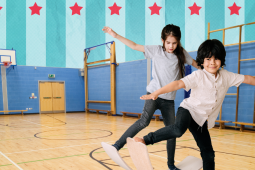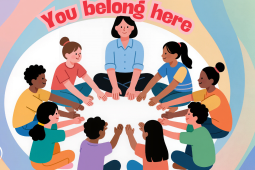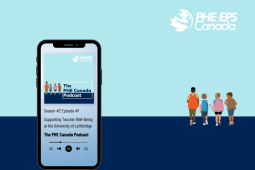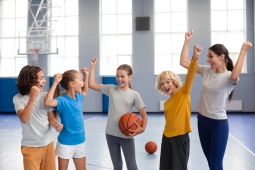Share2Care 2018 : Q&A with Centre for Learning Alternatives
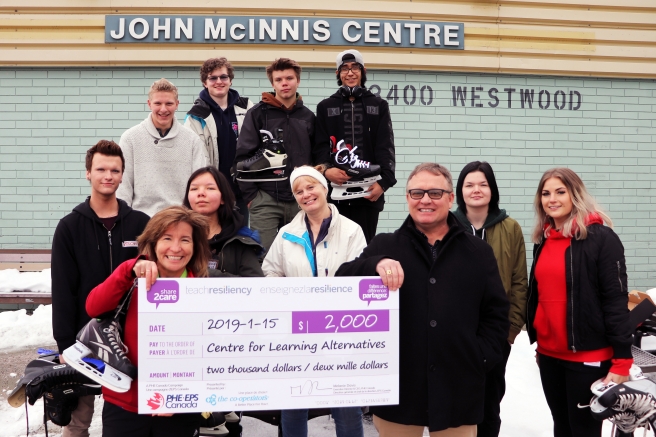
Share2Care is a mental health activation initiative gathering promising practices from across the country to share and inspire others to take action in their class and/or school community. As part of the PHE Canada Teach Resiliency program, Share2Care aims to recognize and share unique, innovative, and promising mental health practices that are making positive impacts on students, school staff, or both.
PHE Canada will share the success stories of the five school initiatives and others on the PHE Canada blog.
Promising Practice - Ventures Program
PHE Canada: what inspired the mental health initiative?
We are a trauma-informed school and all our work is informed from this perspective. Our population are considered "at risk" youth and approximately 65% are First Nation ancestry. Many live in extreme poverty. In order to attend our school, students must have exhausted all the mainstream school supports, be in danger of dropping out, and be in need of extensive supports including targeted mental health initiatives. Over half of our students have an official mental health diagnosis and many more remain undiagnosed.
These mental health issues affect their attendance, school progress, and their overall well-being. We believe the combination of the outdoor environment, physical activity and giving back to others in a well supported therapeutically engineered program will improve their overall health, attendance and confidence. Being connected to one's community (school and extended community) is a factor proven to improve mental health, decrease isolation and reduce depression. Through the development of Ventures we feel we have addressed all of these issues.
PHE Canada: What activities were offered in this initiative?
The initiative is a 10 month combined studies course that is a combination of Physical Education, Outdoor Education and Leadership. The program is administered by a Registered Clinical Counsellor (who is also a certified teacher and Physical Education specialist) and a youth care worker who specializes in mental health.
.jpg)
Each class starts and ends with a talking circle. Students are encouraged to rate themselves on a scale of 1-10 and share anything they feel appropriate. This helps students to make the connection between physical activity, the outdoors and the supportive environment to their mental health while creating a cohesive and safe group. Students are also taught empathetic listening skills and take part in graduated trust-building exercises to aid this process. Throughout the year students are exposed to various trails, outdoor recreation facilities and community civic facilities as this will help them further connect to the community.
As a group, Ventures students take part in community volunteering, further strengthening community ties while giving a sense of place. This could become a valuable experience and help with scholarship, bursaries and job applications in the future.
PHE Canada: What are the learnings from your initiatives?
We have learned students rise to a challenge when given the opportunity. We have learned the power of a group to support a struggling youth is powerful.
Last summer, one of the Ventures students was very very low and was considering taking a bottle of pills. She messaged one of her Ventures classmates and in minutes, 6 of them were at her home (and spent the night). We are so thankful she was so well-connected with youth who knew how to help.
PHE Canada: What is the overall impact of your initiatives?
The current attendance of students in the Ventures program is 87% while the school attendance is approximately 62%, the Ventures students finish more courses during the school year. While we do not officially record the students' scale numbers individually at the start of class, it has NEVER been lower at the end of class. The class average at the start of class is 5 and at the end is an average of 9, which indicates a significant increase.
PHE Canada: How are your initiatives or promising practices sustainable?
Our administration is in full support and we have developed numerous community partnerships that benefit all involved. (For example, we clear brush in the fall at the cross country ski centre and we ski at a reduced rate.) Students are learning skills in Ventures that can help support their peers in our school. We are also very connected to the elementary school next door and we would like to increase our relationship as role models and mentors in the upcoming months through new initiatives such as a Peer Mentor program and Tea Time at our school.
PHE Canada: How would you put your Share2Care funding to use?
We will give out prizes at our monthly themed activities. The funding will also help to pay for the Mental Health First Aid training. We plan to travel to Prince Albert to network with other schools. The funding will also help to support the year-end celebration supper, peer support volunteer awards, and peer support collateral.
The funding will help to support a variety of training, such as peer mentor training, Wilderness first aid/team building, psychological first aid youth training, High 5 Principles of Child Development training. The funding will also help to organize our Mental Health Awareness Day event, forum, and workshops.





